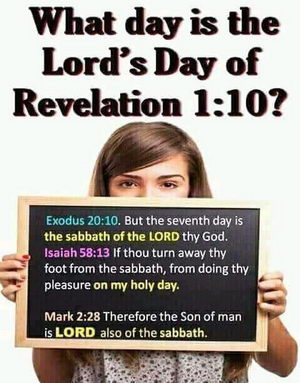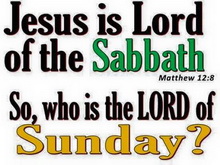Revelation 1:10 - What Day is the Lord's Day?
Many Christians today believe that the Lord's Day is Sunday but this is incorrect and is actually a doctrine of man. You will not find one single verse in the Bible where God identifies Himself with any day other than the seventh day Sabbath such as the following examples. (Genesis 2:3; Exodus 20:8-11; Scriptures) There are three places in scripture that show that the Lord does have a special day but there is not one verse that so much as gives even a hint that the first day of the week, being Sunday, is the Lord's Day.
Many of those who have been led astray by the ruler of this world claim it is Sunday based on the following verse.
Revelation 1:10 “I was in the Spirit on the Lord's Day, and heard behind me a great voice, as of a trumpet.”
But would someone please show me where this verse implies even so much as a hint of Sunday?
So what scriptures are there that show Jesus is Lord of a specific day? The following three are the only ones that specifically say what day Jesus is Lord of and that is the Seventh day Sabbath. Now this is not by assumption or by my own thoughts but by what the Bible says. (Matthew 12:8; Mark 2:28 and Luke 6:5)
So where does the idea of Sunday come from? It is primarily believed by those who have been deceived that it was changed at the cross based on a couple of verses about Sunday meetings which did not even occur in a Church and on tradition. See what day is the Sabbath day for more on these verses. Please note that Sunday is based on tradition and that Jesus had some very solemn and stern words to say about those keeping tradition in place of His Commandments and that it is definitely not acceptable. (Mark 7:6-9)
Here are some typical arguments used to try and persuade Christians into believing it is Sunday that are from our adversary to keep Christians from obeying the fourth Commandment.
- Jesus rose on the first day of the week so it must be Sunday. — This argument has no biblical foundation and hence is an assumption. If scripture does not say so, it is not so.
- Pentecost falls on a Sunday. — So if Pentecost fell on a Saturday would this argument still be used? I guarantee there would be silence. The day Pentecost falls on or Jesus rose does not change a Commandment of God.
- Early Christians called it Sunday from 30-300AD because Jesus rose this day. — The antinomian stating this could not provide a quote earlier than 107 A.D. as there are none. Note that 107 A.D. is an entire life time past 30 A.D. The accredited historical records reveal that it was not so called until sometime after the Jewish wars in 70 A.D. (hence his earliest quote of 107 A.D.) and so 30 A.D. is an extreme stretch of the truth. Or should we say a lie in an attempt at proving yet another lie. This dishonesty alone reveals those deliberately coming against the truth. There is also no Biblical foundation and is an assumption as per point 1.
- Acts 20:7 is the only example of the Lord's Supper. — Every meal involved prayer for the food provided and breaking of the bread. See Acts 2:46 and Matthew 15:36 for instance. And Acts 20:7 was after sunset and so in fact is what we today would call Saturday night or evening as two Bible translations have correctly stated. So by this argument it would be Saturday. See Acts20:7 - Is Sunday the Sabbath for more detailed information.
- Only some languages use Sunday such as English where Latin languages such as Italian use a derivative of the Latin word such as Dominica, which means Day of the Lord or the Lord's Day. — That much is true but when and where does this come from? Hover your mouse over the meaning of Sunday from Wikipedia on the names of the days of the week and note the meaning and origin of Dominica from the Oxford Dictionary, “a country in the western West Indies ... Origin: named by Columbus, who discovered it on a Sunday (Latin dies dominica 'the Lord's day') in 1493.” So this name was not applied to Sunday until 1493, which is more than 1000 years after the cross and just as long after man first chose to call Sunday the Lord's Day against the will of God. So misleading information was once again used to try and prove a lie.
- The five books that John wrote always called the Sabbath the Sabbath while in Revelation 1:10 he calls it the Lord's Day and so it is not the Sabbath. — Since Revelation is one of those five books then the statement of John always calling the Sabbath the Sabbath is only correct if John is not referring to the Sabbath in Revelation 1:10. So this is a straw mans argument using no logic at all that is worse than eisegesis in some ways.
- Psalms 118:22-24 says it is Sunday. — More eisegesis as there is no Biblical evidence that the phrase the day which the LORD has made refers to Sunday. See Psalms 118:24 Commentary for detailed information.
 The fact is that real history and not the distorted non-truths or half facts shows that everyone was still keeping the Sabbath on the Seventh day being what we call Saturday until after the time of the Jewish wars (70-90 A.D.) when some began switching to Sunday in fear of persecution for Judaism. That was more than half a lifetime after the cross!
The fact is that real history and not the distorted non-truths or half facts shows that everyone was still keeping the Sabbath on the Seventh day being what we call Saturday until after the time of the Jewish wars (70-90 A.D.) when some began switching to Sunday in fear of persecution for Judaism. That was more than half a lifetime after the cross!
There were many more steps involved in the change of the Sabbath to Sunday but it was these steps that eventually resulted in Sunday being called the Lord's Day against the will of God. This could never have been a part of the New Covenant, as that was sealed by the blood of Christ at the cross and cannot be changed afterwards.
Note that the New Covenant was sealed by the blood of Jesus on that Friday when he gave up His Spirit and cried out “it is finished.” Scripture says it is impossible for any change to occur to the New Covenant such as the Ten Commandments or anything for that matter once it was sealed. (Galatians 3:15; Hebrews 9:16-17) It was more than forty years after the cross when Luke wrote in chapter 23:55-56 that they, “…they rested the Sabbath day according to the Commandment.” This day they rested was after the New Covenant was sealed by the death of Christ so Sunday is in fact impossible and can never be the Lord's Day. See is the Sabbath in the new Covenant, which also proves that a literal Sabbath keeping remains as part of the New Covenant.
It was in fact more than 300 years after the cross that Lucium who was an early church historian wrote that Rome begun calling Sunday the Lord's Day. It was in Rome and Alexandria that this first happened and it was much later when other locations were forced to follow this change. Hover your mouse over Sunday to see it was a pagan day that came from worship of the Sun and not from worship of the Son of God. Read how was the Sabbath changed to Sunday or who moved the Sabbath to Sunday for more information.
Hence Sunday is not and cannot be the Lord's Day and Revelation 1:10 refers to what can only be the day we call Saturday and not Sunday.
There is also an excellent, unbiased 5 DVD documentary on the true history of the Sabbath that proves how the Sabbath was changed to Sunday. The information has been supplied by more than fifty historical experts on the Sabbath from all walks of life. See the history of the Sabbath day to watch this online.